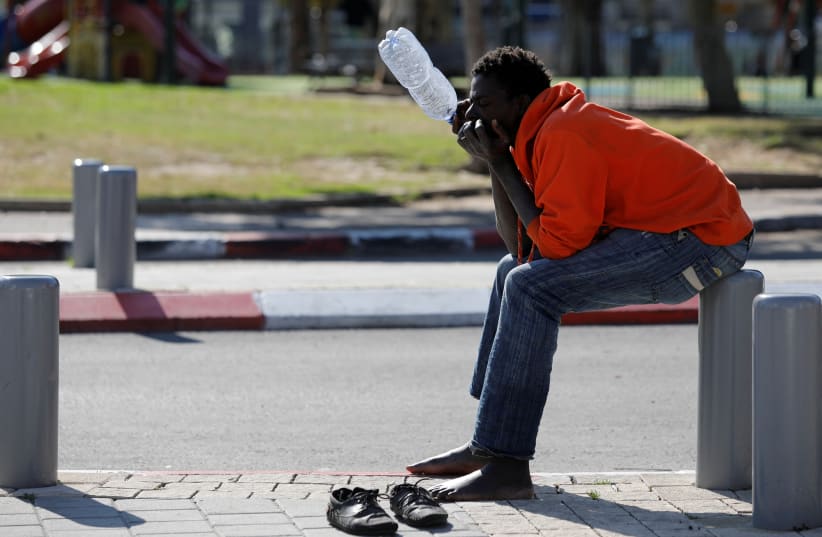A Related Video You May Like:
HAVING first emerged with a plan to relocate 35,000 illegal migrants in Rwanda and Uganda, Netanyahu this week emerged within 24 hours with three successive changes of course.First he announced an agreement with the UN High Commissioner of Refugees to ship half the migrants to Western countries and absorb the rest in Israel; then he said he was suspending this agreement; and finally he said he was canceling it altogether.While at it, Netanyahu baffled Italy and Germany, which – beset by their own migrant crises – denied his insinuation they were parties to his deal.Worse, Netanyahu turned his back on a signed deal with the UN, thus damaging Israel’s diplomatic reliability.Worse yet, it turned out he negotiated without involving key allies such as Education Minister Naftali Bennett and relevant officials such as Justice Minister Ayelet Shaked.It was a breathtaking display of recklessness underpinned by a refusal – or inability – to tell his followers unpleasant truths.Originally, Netanyahu had a clear view and plan. The view was that Israel’s illegal immigrants were mostly not asylum- seekers but job-seeking infiltrators, and the plan was to get them out.The problem, according to Netanyahu, was that Rwanda changed its mind. Netanyahu now legitimately turned to pragmatic alternatives. Having then obtained the deal with the UN, his task was to turn to the xenophobic part of his following, led by Culture Minister Miri Regev, and say: “This is the right thing to do, both in terms of the Israeli interest and of Jewish values.If you don’t like it – don’t vote for me.”This Netanyahu was not prepared to do.LIKE AARON – the biblical priest whose eloquence proved irrelevant when it was time to confront the mob’s demand that he sculpt it an idol – Netanyahu hastily retreated, then uttered flowery words about rehabilitating south Tel Aviv’s slums, and then joined the mob by pandering to its hatreds, twice: First, by accusing the New Israel Fund of making Rwanda change its mind, and then by contrasting “the distressed neighborhoods” where the migrants live, with “the strong settlements, the kibbutzim and moshavim” – meaning Labor’s bastions – where 16,000 migrants would be resettled.Netanyahu’s real problem was that the deportation idea divided people in a way that did not overlap the Left-Right rift with which he is familiar, and in which he thrives.On the Left, Labor Party leader Avi Gabbay supported the deportations; on the Right, veteran settler leader Yisrael Harel called to absorb the migrants “in the name of compassion,” arguing that “30,000-35,000 people mixing within a population of more than 8 million are not a liability”; and in between these poles, American Jews warned of a media catastrophe should white Israelis expel black Africans.This legitimate American Jewish concern likely troubled Netanyahu no less than what contradicted it, the electoral backlash of a failure to deliver on his vow to deport all illegal migrants.It was all very confusing for Netanyahu, who throughout the saga’s many stages never went to any of his contradictory constituencies and argued with it, deluding himself instead that with an empty promise here and a conspiratorial broadside there he could please everyone all the time.That’s not leadership.The deportation dilemma is not the southern-fence project, about which everyone agreed. This is about doing the right thing despite political costs, the way Begin did when he gave land for peace, and the way Ben-Gurion did when he dismantled the Labor-affiliated Palmah in order to depoliticize the IDF.There was a time when Netanyahu also displayed such leadership.It happened 15 years ago, when as finance minister he cut social spending despite this move’s alienation of some Likud voters, and slashed child allotments despite his ultra-Orthodox allies’ wrath and threats.As with the migrant crisis, all policy choices were unpleasant in that situation, when the country was in the midst of a harsh recession and a fierce war of terrorism – but some choice had to be made unequivocally, and then pursued with consistency and resolve. The Netanyahu of those days was prepared to do this. The current one is not.The Netanyahu who this week zigzagged the way one should when chased by a crocodile, is the same one who reversed his own government’s decision to accommodate non-Orthodox prayers at the Western Wall; the same one who first condemned Sgt. Elor Azaria, who killed a neutralized terrorist, and then followed his fans’ lead; the same one who before the 2015 election vowed “to pass within 100 days of the next election a law to change the system of government,” but to this day has not even written that bill; the same Netanyahu who thinks you can’t fool all the people all the time – unless you are Bibi Netanyahu.
Netanyahu’s leadership: An autopsy
The Netanyahu who this week zigzagged the way one may when chased by a crocodile, is the same one who reversed his own government’s decision to accommodate non-Orthodox prayers at the Western Wall.
